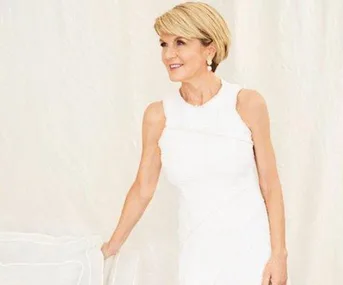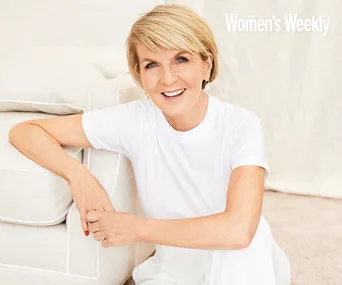Julie Bishop may not be the next Prime Minister of Australia, but the Deputy Leader of the Liberal Party isn’t going anywhere anytime soon.
62-year-old Bishop has been a member of the Australian House of Representatives for the Liberal Party for 20 years, only going into politics in her 40s.
Before she made the career change, the South Australian native was a successful Lawyer, obtaining her degree at the University of South Australia.
She’s been an open book when it comes to her personal life. Here’s what we know about Minister for Foreign Affairs Julie Bishop …
READ NEXT: Julie Bishop’s first public speech since Scott Morrison’s appointment to PM

Julie Bishop and Reese Witherspoon at the United Nations International Women’s Day delivering keynote on driving prosperity and indopacific female empowerment back in March.
Julie Bishop family
Ms Bishop was never going to escape the call of a career in politics – it’s in her blood. Both her mother and grandfather were mayor of their hometown local council.
She is one of four children (3rd born) raised on her family’s apple and cherry orchard in the Adelaide Hills.
Ms Bishop attended St Peter’s Collegiate Girls’ School in Adelaide, was captain of the debating team and co-head prefect (the perfect combination for a career as an MP).
EXCLUSIVE: Julie Bishop’s thoughts on ex Prime Minister Gillard

Julie Bishop gave an exclusive interview to this month’s edition of The Australian Women’s Weekly.
Julie Bishop and partner, boyfriends and husband
Husband: Neil Gillon
Like the rest of her personal life, Ms Bishop has always been very open when it comes to her romantic life.
Back in 1983, before getting into politics, Ms Bishop married wealthy property developer Neil Gillon in 1983 and moved to Perth in an attempt to make the relationship work, however the union only lasted five years with the pair divorcing in 1988.
Boyfriends: Former Liberal Senator Ross Lightfoot and former Perth Lord Mayor Peter Nattrass
Ms Bishop has been part of a few high-profile relationships since her divorce from Gillon, most notably former Liberal Senator Ross Lightfoot and former Perth Lord Mayor Peter Nattrass in the past.

Julie Bishop and current boyfriend David Panton.
Partner: David Panton
The Liberal MP’s current partner is property developer and winemaker David Panton.
Panton is often seen to be travelling with Bishop, with the latter previously mentioning the couple started dating back in 2014.
There has been controversy around Panton travelling with the Minister for Foreign Affairs. As he’s not registered as Bishop’s “spouse” or de facto partner, his financial interests are not on the parliamentary register, which is cause for concern when and if Bishop claims taxpayer-funded family travel.
The pair does not live together, with Bishop residing in her Perth electorate of Curtin, while Panton resides in Sydney.
The Foreign Minister is said to have a great relationship with Panton’s three adult children.
Julie Bishop on having children
In an interview with Kidspot Ms Bishop shared that while she always thought she would have children, her life turned out differently than she imagined.
“It wasn’t a decision – it is how life turned out,” she revealed.
“I’ve never been though a grieving process and now I wouldn’t, because what’s the point?” she told News Corp in a separate interview back in 2013.
“I’m not having kids, there’s no point lamenting what was or what could have been.”
Julie Bishop and feminism
Julie Bishop clearly displays all the hallmarks of a feminist – but she prefers not to use such labels.
“I’ve lost count of the number of times I’ve been asked to call myself a feminist. I don’t label myself as anything,” she retorts.
“I think I label myself as a West Australian, that tells you where I’m from; I label myself as a Liberal, that tells you my political party; I label myself as socially progressive, economically conservative, that tells you my values. I’m a Christian, that tells you my religion, but other than that I don’t seek to label… look at what I do. If what I do is about supporting equality of opportunity for women, then that’s what I want to be known for,” Julie Bishop recently told The Australian Women’s Weekly.
In line with this, Julie told Kidspot back in 2013 that she doesn’t believe women can “have it all”, instead thinks life is about choices.
“I’m in the Anne-Marie Slaughter school – women can’t have it all,” Ms Bishop told the publication. “They can have plenty of choices, but at the end of the day, they choose something which means they can’t have something else.”

Julie Bishop



